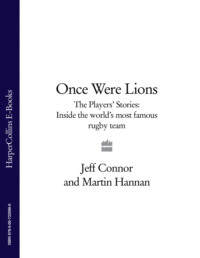
Once Were Lions: The Players’ Stories: Inside the World’s Most Famous Rugby Team
‘There can be no halfway house in rugby football’, wrote J.A. Smith, the secretary of the SFU.
The daily allowance made to the players is directly antagonistic to the true spirit of amateur Rugby football. The payment means that, in addition to every possible expense, including uniforms, laundry, entertainments, gratuities and medical attendance, each player has received at least one pound and one shilling a week for himself, and my committee consider that this payment is tantamount to professionalism in a very insidious form.
The Scots made it clear they would not play against New Zealand’s ‘professionals’, and when England sided with the All Blacks, the SFU broke off relations with the RFU. Ireland also withdrew its cooperation on the same grounds.
The 1908 Lions therefore played in jerseys made up of hoops of white and red, the traditional English and Welsh colours, and that is one of the reasons many books and commentators refer to this as the Anglo-Welsh tour. But they were billed as the British touring party, and the invitation and organization were done in the now customary manner, so Lions they were, though by all accounts there was not the usual atmosphere of friendliness in the camp.
Selecting from just two nations and taking unproven players was to prove a pivotal point in the history of the British and Irish Lions. For after they returned a well-beaten side, the Welsh Rugby Union complained about the selection of players being for reasons of social class rather than distinction on the field. Two years later, that complaint would be formalized.
Whatever the reason for their failings, it certainly seems to be the case that the squad was weak when you consider the 1908 side’s results. As well as two losses to provincial sides in Australia, they lost seven of their matches in New Zealand, including two of the three Tests against the All Blacks.
To be fair, in the middle Test of the three, the Lions were unlucky to get only a draw, but Harding’s men apparently enjoyed too much of the lavish hospitality of their hosts and greatly underperformed in the final deciding Test, in which the All Blacks ran riot, scoring 9 tries and 29 points in all against none by the tourists.
The 1908 Lions did not even go down fighting, but then there had been a strange atmosphere in the party ever since they had lost one of their best players in the middle of the tour. In the biggest scandal to engulf the early Lions, Frederick Stanley Jackson, a Cornish giant who played for Leicester, was alleged to have been a professional rugby league player called John Jones from Swansea. Jackson was a star player, a lethal goal kicker who had helped Cornwall to the county championship, which in turn gave them entry to the 1908 Olympic Games where the men from the Duchy won the silver medal, losing to Australasia, i.e. Australia and New Zealand combined.
An Olympic medallist and one of the best-known players in the sport of rugby union involved in a murky business—not surprisingly, the newspapers had a field day, and the RFU had to act. A terse telegram was sent to tour manager George Harnett: ‘Jackson is suspended. Return him forthwith.’
The player set off for Sydney, leaving his close friend and fellow Leicester player and Lion, John Jackett, in tears on the quayside. Jackett himself had a notorious past which was already well known—a muscular Adonis, he had posed as a nude model, strictly for art’s sake of course.
But Jackson never made it home. Instead, he was greeted by pressmen at Sydney, and categorically denied any knowledge of the charges against him. He then disappeared, only to resurface in New Zealand after the Lions had finished their tour. Jackson had gone back to find a Maori woman that he had met during the tour, and it truly was a love match—they had four children, one of whom, Everard, would become an All Black prop before losing a leg fighting in the desert campaign in the Second World War.
Happy with his new wife in his new homeland, Frederick Jackson also played for New Zealand—funnily enough, at rugby league. He was capped for his new country in 1910 against the Northern Union, the then name of the British rugby league touring side, which beat New Zealand 52–20. Jackson lived until 1957, and despite research by his family, no one has ever been able to prove whether he was indeed either Jackson or Jones. The man himself never let on.
The Jackson scandal was just one of several problems for the 1908 Lions. This debacle of a tour was to prove a catalyst for the biggest change in the set-up of the Lions. Before the next tour to South Africa in 1910, and stung by the fact that the ‘colonials’ had become the masters of world rugby, the four home unions took a hand and decided that, from then on, the tourists would represent them as fully as any side which turned out in the white, blue, green or red jerseys of their home unions. Players selected for Tests would also be recognized—by some people at any rate—as full internationalists. The British and Irish Lions were formally born, though not yet called Lions.
Конец ознакомительного фрагмента.
Текст предоставлен ООО «ЛитРес».
Прочитайте эту книгу целиком, купив полную легальную версию на ЛитРес.
Безопасно оплатить книгу можно банковской картой Visa, MasterCard, Maestro, со счета мобильного телефона, с платежного терминала, в салоне МТС или Связной, через PayPal, WebMoney, Яндекс.Деньги, QIWI Кошелек, бонусными картами или другим удобным Вам способом.
Вы ознакомились с фрагментом книги.
Для бесплатного чтения открыта только часть текста.
Приобретайте полный текст книги у нашего партнера:
Всего 10 форматов